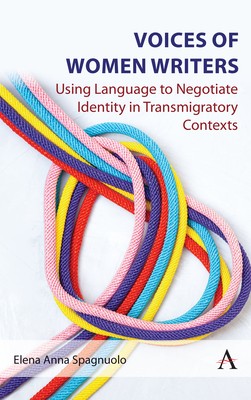
- We will send in 10–14 business days.
- Author: Elena Anna Spagnuolo
- Publisher: Anthem Press
- ISBN-10: 1839987987
- ISBN-13: 9781839987984
- Format: 15.2 x 22.9 x 1.3 cm, hardcover
- Language: English
- SAVE -10% with code: EXTRA
Reviews
Description
This book investigates the phenomenon of self-translation within the context of mobility, through the analysis of a corpus of narratives written by writers who were born in Italy and then moved to English-speaking countries. Understanding self-translation as a practice, which exists in conjunction with a process of redefinition of identity, the book illustrates how these authors use language to negotiate and voice their identity in (trans)migratory contexts.
(Trans)migration refers to a process through which mobile subjects are 'firmly rooted in their new country', but at the same time maintain 'multiple linkages to their homeland' (Schiller, Basch, and Szanton Blanc 1995: 48). The (trans)migrant experience is at the core of the writing and self-translating performances of the authors in my corpus. On the one hand, it is the reason why they self-translate. The need to express their voice in both languages leads them to produce a double text. Indeed, they attempt to achieve a simultaneous existential embeddedness, by means of a simultaneous linguistic embeddedness. On the other hand, the (trans)migrant experience constitutes the object of their activity. It is recreated in the text, on both the level of content and language. From a thematic perspective, it appears in the rethinking of a number of traditional tropes. From a linguistic perspective, it emerges through code-switching, as well as through a specific form of self-translation, which is located at the juncture between writing and translating.I investigate the experience of transmigration in relation to what Yildiz calls 'the monolingual paradigm' (2012). According to this paradigm, individuals possess one exclusive mother tongue -the language we learn from our parents and grow up with. The mother tongue ties individuals to specific linguistic, cultural and physical spaces, defining their identity within precise borders and boundaries. Nonetheless, transmigration challenges the monolingual paradigm, as transmigrants forge associations with multiple spaces. Experiencing the 'impossibility of the monolingual paradigm' (Yildiz 2012), the authors in my corpus resort to writing and (self)translating to recreate their transmigrant experience on the page and challenge monolingual assumptions about language and identity. Indeed, their literary productions express and exploit the creative and existential possibilities of a life at the crossroads.EXTRA 10 % discount with code: EXTRA
The promotion ends in 20d.17:40:15
The discount code is valid when purchasing from 10 €. Discounts do not stack.
- Author: Elena Anna Spagnuolo
- Publisher: Anthem Press
- ISBN-10: 1839987987
- ISBN-13: 9781839987984
- Format: 15.2 x 22.9 x 1.3 cm, hardcover
- Language: English English
This book investigates the phenomenon of self-translation within the context of mobility, through the analysis of a corpus of narratives written by writers who were born in Italy and then moved to English-speaking countries. Understanding self-translation as a practice, which exists in conjunction with a process of redefinition of identity, the book illustrates how these authors use language to negotiate and voice their identity in (trans)migratory contexts.
(Trans)migration refers to a process through which mobile subjects are 'firmly rooted in their new country', but at the same time maintain 'multiple linkages to their homeland' (Schiller, Basch, and Szanton Blanc 1995: 48). The (trans)migrant experience is at the core of the writing and self-translating performances of the authors in my corpus. On the one hand, it is the reason why they self-translate. The need to express their voice in both languages leads them to produce a double text. Indeed, they attempt to achieve a simultaneous existential embeddedness, by means of a simultaneous linguistic embeddedness. On the other hand, the (trans)migrant experience constitutes the object of their activity. It is recreated in the text, on both the level of content and language. From a thematic perspective, it appears in the rethinking of a number of traditional tropes. From a linguistic perspective, it emerges through code-switching, as well as through a specific form of self-translation, which is located at the juncture between writing and translating.I investigate the experience of transmigration in relation to what Yildiz calls 'the monolingual paradigm' (2012). According to this paradigm, individuals possess one exclusive mother tongue -the language we learn from our parents and grow up with. The mother tongue ties individuals to specific linguistic, cultural and physical spaces, defining their identity within precise borders and boundaries. Nonetheless, transmigration challenges the monolingual paradigm, as transmigrants forge associations with multiple spaces. Experiencing the 'impossibility of the monolingual paradigm' (Yildiz 2012), the authors in my corpus resort to writing and (self)translating to recreate their transmigrant experience on the page and challenge monolingual assumptions about language and identity. Indeed, their literary productions express and exploit the creative and existential possibilities of a life at the crossroads.

Reviews